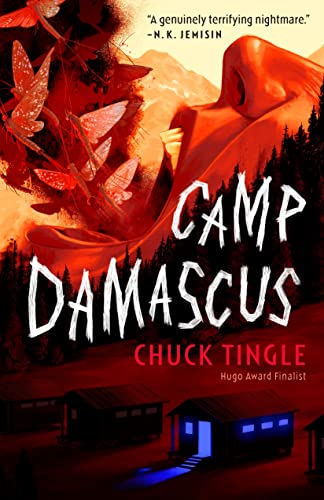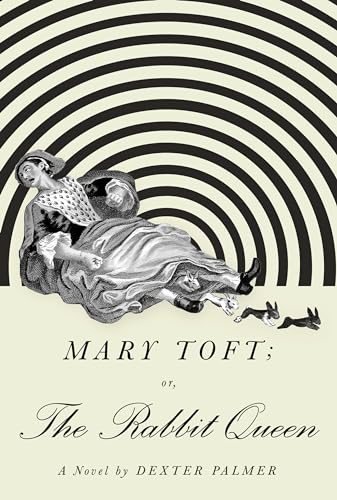Perhaps the most surprising thing about prolific queer erotica author Chuck Tingle—who, talking via Zoom from his new home in Los Angeles, wears a gray T-shirt, a white karate gi, a bubblegum pink bag over his head with the phrase “LOVE IS REAL” emblazoned across the forehead, and sunglasses—is his insistence that he is not doing a bit. “I understand that I have a pretty funny way to some,” Tingle says, “but most of the time, I am being sincere, and that just gets a dang laugh.”
 Tingle, who has self-published more than 300 absurdist erotic shorts (termed “tinglers”) since 2014’s My Billionaire Triceratops Craves Gay Ass and is gearing up for his full-length horror debut and first traditionally published release, Camp Damascus, also claims to hold a doctorate in “holistic massage” from DeVry University, which offers no such degree. When asked his age, he requests that it be printed as “unknown,” adding “there are legitimately mysterious circumstances around my birth.” (He appears to be in his mid-40s.) But while Tingle admits to cultivating an air of secrecy and surrealism around his pseudonymous author persona, he also asserts that all of his work to date—and by extension its mission to “prove love”—has been entirely in earnest.
Tingle, who has self-published more than 300 absurdist erotic shorts (termed “tinglers”) since 2014’s My Billionaire Triceratops Craves Gay Ass and is gearing up for his full-length horror debut and first traditionally published release, Camp Damascus, also claims to hold a doctorate in “holistic massage” from DeVry University, which offers no such degree. When asked his age, he requests that it be printed as “unknown,” adding “there are legitimately mysterious circumstances around my birth.” (He appears to be in his mid-40s.) But while Tingle admits to cultivating an air of secrecy and surrealism around his pseudonymous author persona, he also asserts that all of his work to date—and by extension its mission to “prove love”—has been entirely in earnest.
The second most surprising thing about Tingle is how easy it is to believe him. In conversation, he comes across as kind, idiosyncratic, and utterly genuine—burlap bag and all. There’s a distinct halting prosody to his twangy speech, and he has a vernacular all his own: people in general are “buds” while Tingle fans are “buckaroos.” Discussing speculation that he may be a troll, Tingle says, “Sometimes buckaroos cock an eyebrow and say, ‘How sincere is this way?’ I understand that, but I can’t be bothered by it. As a buckaroo on the autism spectrum, I’ve come to a place where I’m fine being a sort of outsider.”
Tingle was catapulted into prominence in 2016, when a far right group of SF/F authors nominated him for a Hugo Award in an attempt to troll the ceremony, which they perceived as rewarding diverse authors at the expense of straight white men. Tingle volleyed back, using his meme-y internet acumen to collect donations for victims of online abuse. Both his editor at Nightfire, Kelly Lonesome, and his agent, Dongwon Song at Howard Morhaim Literary, cite this incident as their introduction to the author.

 To a niche corner of the internet, Tingle has since achieved superstardom due to his delightfully outrageous book covers. All sport stock image collages and titles that take on a Mad Libs quality, generally beginning “Pounded in the Butt by….” Tingle then fills in the blank with whatever supernatural creature, sentient object, or personified concept strikes his fancy. (Pounded by President Bigfoot is on the tame end of the spectrum; things get more high-concept in Pounded in the Butt by My Own Butt, which realizes its conceit through some unexpectedly intricate sci-fi worldbuilding.)
To a niche corner of the internet, Tingle has since achieved superstardom due to his delightfully outrageous book covers. All sport stock image collages and titles that take on a Mad Libs quality, generally beginning “Pounded in the Butt by….” Tingle then fills in the blank with whatever supernatural creature, sentient object, or personified concept strikes his fancy. (Pounded by President Bigfoot is on the tame end of the spectrum; things get more high-concept in Pounded in the Butt by My Own Butt, which realizes its conceit through some unexpectedly intricate sci-fi worldbuilding.)
These covers have earned Tingle the nickname My Favorite Author I’ve Never Read, but he hopes that Camp Damascus will make this moniker obsolete. Asked about his decision to traditionally publish, Tingle cites the opportunity to grow his readership: “I am constantly striving to prove love to a broader audience.”

Tingle’s unusual path to a book deal began when he tweeted at Tor, exciting longtime follower Lonesome, who brought Song on board. (“It’s a move I don’t recommend,” Song says. “But Chuck’s not one to do things like everyone else does.”) Lonesome emphasizes how important it was that Nightfire took the book seriously “from the jump”: “Chuck was like, ‘Look, this is a real book. I’m serious about this. Are you?’ and I was like, ‘Hell yes,’ ” she says. Indeed, the publisher is putting its all behind Camp Damascus, which has garnered glowing blurbs from genre titans including N.K. Jemisin and John Scalzi.
The book may also be the best evidence of Tingle’s sincerity. It’s not often that a horror novel could be described as wholesome, but Camp Damascus has heart as big as its bite.
Tingle situates Camp Damascus within the current boom of queer horror, but also within a less developed subgenre he terms “neurodivergent horror.” The protagonist, 20-year-old Rose, is a devout member of the Kingdom of the Pine, a Christian sect famed for its conversion therapy camp. Whenever Rose’s thoughts linger too long on attractive women, she endures cold spells, coughs up insects, and witnesses bizarre apparitions. As cracks form in her faith and she realizes her sexuality, it’s heavily implied that Rose’s ability to break through the cult’s brainwashing is due to the fact that she’s on the autism spectrum.
“I want to tell stories about the sort of heroism that you can find in other ways of thinking,” says Tingle, who discloses that a great deal of himself went into Rose’s character.
Discussing Rose’s autism, Tingle becomes emotional, sharing a deeper backstory to the creation of his author persona. “I am actually very, very good at appearing to be neurotypical,” he says. “But it began to take a toll on my life.” He developed chronic pain that only dissipated after he “created a space for myself with my writing where I could be the most honest version of myself.”
 In all its supernatural spookiness, Camp Damascus is a departure from most of Tingle’s work (he made one earlier foray into horror with the self-published novella Straight), but he also notes a similarity between comedy, erotica, and horror: they’re genres people look down on. “If someone says, ‘Oh, I laughed’; or if you’re horrified and you scream; or with erotica and romance, if you’re aroused—all of these reactions are of the body,” rather than the mind. For Tingle, “that’s where the honesty lies.”
In all its supernatural spookiness, Camp Damascus is a departure from most of Tingle’s work (he made one earlier foray into horror with the self-published novella Straight), but he also notes a similarity between comedy, erotica, and horror: they’re genres people look down on. “If someone says, ‘Oh, I laughed’; or if you’re horrified and you scream; or with erotica and romance, if you’re aroused—all of these reactions are of the body,” rather than the mind. For Tingle, “that’s where the honesty lies.”
Camp Damascus is never sleep-with-the-lights-on scary, but it conjures a menacing atmosphere. Though the book is crawling with demons, it’s the humans that truly terrify. This was intentional.“Writing horror for any marginalized group,” Tingle says, “you have to recognize that what is happening in the dang world—without any supernatural elements—is already traumatic.”
Part of this, for Tingle, was to ground Kingdom of the Pine in realism. “This church is not that out-there—they’re pretty normal,” he says. At the same time, he acknowledges that religion itself isn’t the problem. “It’s not necessarily the story; it’s interpreting the story for hate.”
Tingle set out to mirror this message in the structure of the novel: “By creating three layers—the literal, a biblical allegory, and then a fairy tale allegory—there are three ways to read this,” he explains, “all stacked like a cake.”
Tingle is agnostic but recognizes that his quest to “prove love” could be seen as spiritual. “Proselytizing something like that is a much better use of your time,” he says, “than taking ancient rules and telling buckaroos they are living incorrectly.”
This attitude is also reflected in what Tingle sees as his position in the queer canon. “For all the stories of trauma and tragedy—which are important to tell—there is a version of this experience that is full of joy, and that is honestly what I have lived. If there are young autistic buckaroos or young bisexual buckaroos who can see someone who’s created this wild and free and chaotic and joyful art, that is where I would like to stand.”
This profile was produced in partnership with Publishers Weekly.













